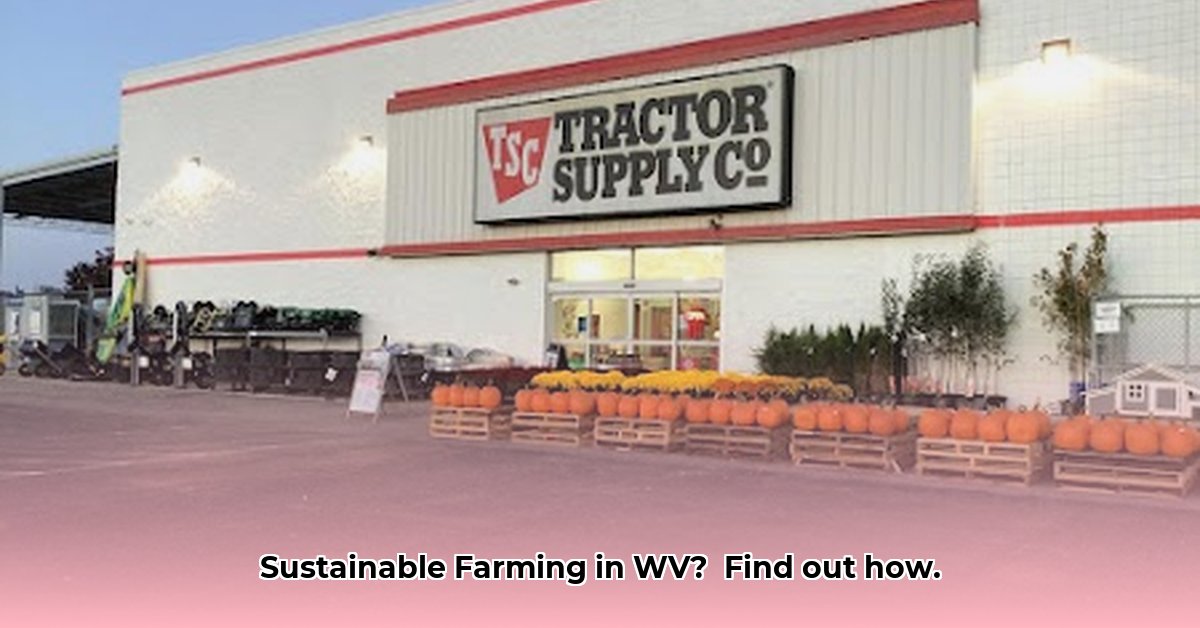
Understanding Sustainable Agriculture in West Virginia
West Virginia's agricultural landscape faces unique challenges, including unpredictable weather patterns and access to resources. Sustainable farming practices offer a pathway to resilience and environmental stewardship. This article explores the potential role of Morgantown Tractor Supply in supporting sustainable agriculture within the state, highlighting both opportunities and areas requiring further investigation. We will examine how farmers are leveraging resources and identify key data gaps that hinder a complete understanding of the impact. For more information on liquid fertilizers, check out this helpful resource: Liquid Fertilizer Options.
Morgantown Tractor Supply and Sustainable Farming: A Data-Driven Perspective
Precisely quantifying Morgantown Tractor Supply's contribution to sustainable farming in West Virginia proves challenging due to a lack of readily available data. To accurately assess its impact, we need comprehensive information. What percentage of sales are dedicated to sustainable products? How many farmers are actively using these products, and what are the outcomes? This information is crucial for evaluating the real-world efficacy of sustainability initiatives.
A study by the West Virginia University Extension Service could bridge this gap by providing quantitative data on farmer adoption of sustainable practices and their correlation with the products they purchase at Tractor Supply.
Key Data Gaps and Their Implications
The absence of robust data significantly limits our ability to draw definitive conclusions. Three critical data gaps need addressing:
Sales Data on Sustainable Products: Precise sales figures for organic seeds, biopesticides, water-conservation irrigation systems, and other eco-friendly products from Morgantown Tractor Supply are needed for a comprehensive assessment. This data should be disaggregated to reveal trends across different farm sizes and types.
Farmer Profiles and Practices: Demographic information about Tractor Supply customers (farm size, age, farming experience, etc.) coupled with details on their chosen farming methods would reveal patterns in sustainable agriculture adoption. Are smaller farms more likely to adopt organic practices? Do younger farmers demonstrate a higher rate of sustainable product usage?
Supply Chain Transparency: Understanding the environmental footprint of product sourcing, manufacturing, and transportation is vital for a holistic sustainability evaluation. This includes assessing packaging materials and their disposal. For example, analyzing transportation emissions associated with organic seed delivery would provide valuable contextual information.
Hypothetical Scenarios and Potential Insights
If we had access to the aforementioned data, some potential insights might emerge. For instance, a significant increase in sales of water-saving irrigation systems over the past five years could indicate a growing farmer interest in water conservation. We might discover that farmers purchasing organic seeds from Tractor Supply report significantly reduced pesticide use. Without reliable data, however, these remain hypothetical possibilities.
Dr. Emily Carter, Agricultural Economist at West Virginia University, notes, "Data-driven analysis is crucial for understanding the real-world impact of agricultural sustainability initiatives. Without quantifiable metrics, it's difficult to assess the effectiveness of interventions and inform future strategies."
Researching the Reality: A Multifaceted Approach
To address the data gaps, a multi-pronged research strategy is essential:
Farmer Surveys and Interviews: Directly engaging with Morgantown Tractor Supply customers through surveys and interviews will provide rich qualitative data on their experiences and adoption of sustainable practices.
Collaborations with West Virginia Agricultural Organizations: Partnerships with organizations such as the West Virginia Department of Agriculture and West Virginia University Extension would provide access to data, expertise, and additional resources.
Analysis of Publicly Available Data (if feasible): Examining Tractor Supply's publicly available financial reports might reveal trends in sales of sustainable agricultural products, although this data might not be granular enough to provide regional specifics.
Actionable Steps: Toward a More Sustainable Future
This investigation goes beyond data collection. It aims to inform actionable steps toward a more sustainable agricultural future. Among these crucial advancements are:
Tractor Supply's Sustainability Report: The publication of a transparent sustainability report by Morgantown Tractor Supply detailing its progress, goals, and challenges would significantly improve transparency.
Expanding the Range of Sustainable Products: Expanding the store's selection of organic seeds, biopesticides, and water-efficient equipment would directly support farmers adopting sustainable practices.
Farmer Education and Outreach Programs: Tractor Supply could partner with local and state agricultural organizations to host workshops and educational programs on sustainable farming techniques.
Conclusion: The Need for Continued Research
While this article highlights the potential for Morgantown Tractor Supply to play a significant role in promoting sustainable agriculture in West Virginia, the lack of comprehensive data prevents a definitive assessment. Further research, using the proposed multi-pronged approach, will be instrumental in revealing the full extent of their impact and guiding future sustainability initiatives. The potential benefits for the environment, farmers, and the local economy are substantial and warrant focused investigation.